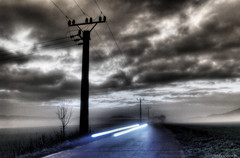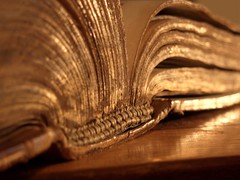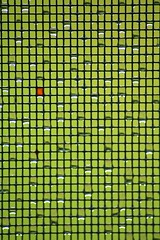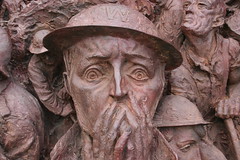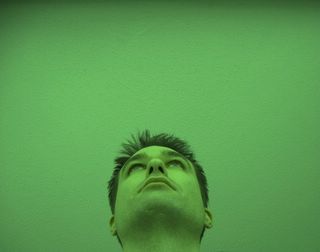 This blow to the head has left me dumb. I can’t think too long or two hard. I suffer from lengthening periods of blank space. I stare into the room and just “am”. Monks meditate to achieve this level of just “being” in the moment. Lowered brainwave activity. Lessened sense of self and a pure perception of the world, observing objects not as tools, but just things as they are. How can a normal person, without a brain injury, look at a sofa and see it as anything other than something to sit on? How can you look at a pillow and not know that it is soft?
This blow to the head has left me dumb. I can’t think too long or two hard. I suffer from lengthening periods of blank space. I stare into the room and just “am”. Monks meditate to achieve this level of just “being” in the moment. Lowered brainwave activity. Lessened sense of self and a pure perception of the world, observing objects not as tools, but just things as they are. How can a normal person, without a brain injury, look at a sofa and see it as anything other than something to sit on? How can you look at a pillow and not know that it is soft?Sunday, August 05, 2007
Dumbfounded
 This blow to the head has left me dumb. I can’t think too long or two hard. I suffer from lengthening periods of blank space. I stare into the room and just “am”. Monks meditate to achieve this level of just “being” in the moment. Lowered brainwave activity. Lessened sense of self and a pure perception of the world, observing objects not as tools, but just things as they are. How can a normal person, without a brain injury, look at a sofa and see it as anything other than something to sit on? How can you look at a pillow and not know that it is soft?
This blow to the head has left me dumb. I can’t think too long or two hard. I suffer from lengthening periods of blank space. I stare into the room and just “am”. Monks meditate to achieve this level of just “being” in the moment. Lowered brainwave activity. Lessened sense of self and a pure perception of the world, observing objects not as tools, but just things as they are. How can a normal person, without a brain injury, look at a sofa and see it as anything other than something to sit on? How can you look at a pillow and not know that it is soft?Monday, July 30, 2007
Heedless Speckle of Stars
 He sleeps easily now, and that bothers him. What right does he have to sleep so soundly? He never admitted with what relish he suffered in his younger days, those restless years of spiritual searching and his tired affectations of a struggling writer. He thinks back on his various experiments: fasting in the woods like a suburban shaman to see visions; subjecting himself to sleep depravation for three days to see visions; following a spirit of a young Navaho boy across the desolation of Utah. Great arches of stone formed a natural amphitheater from which to cup his screams and fling them skyward. Heedless speckle of stars.
He sleeps easily now, and that bothers him. What right does he have to sleep so soundly? He never admitted with what relish he suffered in his younger days, those restless years of spiritual searching and his tired affectations of a struggling writer. He thinks back on his various experiments: fasting in the woods like a suburban shaman to see visions; subjecting himself to sleep depravation for three days to see visions; following a spirit of a young Navaho boy across the desolation of Utah. Great arches of stone formed a natural amphitheater from which to cup his screams and fling them skyward. Heedless speckle of stars.He tries to stay awake all night like he used to, but can’t resist turning on the tv and falling asleep to Jay Leno. What more can you expect from a corporate middle manager? He thinks about buying a tank of ether and a mask and resorting to artificial means of hearing voices. He wants to see hallucinations whipping about the room, imaginary children playing in the hedges, recently escaped from Our Sacred Heart of the Feeble Minded. He looks dejectedly at the sterile rooms of his apartment. What kind of atmosphere do you need to lure the muses? They need a welcome mat, a comfortable abode in which to spend their long weekends, a place that feels like a bed and breakfast for the beyond. He pictures himself small-talking with them in the late morning hours, sipping tea and nibbling on pastries. What would they talk about? Probably how bad the traffic was coming out of Olympus, or the humidity, or his hammer toe.
Monday, July 16, 2007
Mighty Mississippi and Pink Lawn Chair
Monday, June 18, 2007
The Extortionist

The relationships graduate to expensive gifts: diamond earrings, all-expense paid trips to Vegas and Vancouver, Caribbean cruises, lodges in the Rockies. Once they pay for her high-rise apartments not too far from their executive offices, she knows they are ready. And she severs them. She tears these powerful men apart, leaves them weeping in their Humvees or their chauffer-driven Lexus’s. Now it is merely a matter of presenting a sound business proposal: the sincerity and feasibility of her talking to competitors, wives, boards of directors. It’s a matter of supply and demand, Darwinian economics, event-horizons.
Saturday, June 09, 2007
One Less
“Don’t call me Missy.”
“Okay, Melissa. How’ve you been? Have you missed me?”
She looks at me, sideways, like she doesn’t quite trust me, but then she ventures her answer.
“A little.”
“A little? Like you miss my sense of humor? You miss my Yankee charm?”
“I miss kissing you.”
That caught me off guard. “I miss that too,” and I walked over to the kitchen and poured us each a glass of water. I wished it was wine, something to calm my nerves, but she didn’t drink wine. Only water.
“So how’s it going with that ex boyfriend of yours? I can’t remember his name.”
“It’s Tom, and he’s not an ex anymore.”
“I don’t want to know his name. I’ll just forget it again. Do you have sex? Don’t answer that. I suppose you do. You both got HPV. He’s the fucker who gave it to you, so no risk, eh? Not anymore.”
She looked hurt now. “We fuck, yes. Is that what you wanted to hear me say? We fuck, and I’m happy.”
“You could die, you know. I read something about it turning into cervical cancer.”
“That’s the other kind of HPV. I won’t get cancer.”
So you think, I wanted to say, but I knew she was probably right. She was the doctor, and I was just a sales guy. Not a very good one at the moment. “So you want to kiss me again?” I asked.
“No. Not right now, anyway.”
I must have pissed her off more than I intended. I wanted to kiss her again, but then what good was it? What could it lead to? Instead I played her some new music I had found on the internet, talked about her family, about the books she was reading, and it took a good twenty minutes before I could look at her apologetically, and then we kissed awkwardly like kids on the playground.
“I can’t kiss you any more,” she said.
“Any more tonight, or any more ever?”
“Any more ever. We’ll start messing around and then what? You know we can’t ever sleep together.”
“So that’s it? It comes down to sex?”
“It comes down to that fact that Tom is nicer to me.”
“Tom who?”
“I’m leaving.”
Sunday, June 03, 2007
Trailer Park Professor

The Professor didn’t read the Sunfish Times like the other locals, instead subscribing to papers from London, New York, and Boston. He read his newspapers seated in his lawn chair from early morning until lunchtime, drinking tea from an insulated mug roughly the size of a bait bucket and brandishing the name of a local gas station. Then he folded up his papers, slapped them against his knee while he looked out towards the lake, and retreated to his trailer.
His trailer was filled with books; nineteenth century novels, historical biography, herpetology, travelogues. Herbs grew in miniature pots, and creeping plants wound their way across drapery rods and down from shelves. His kitchen countertop was a clutter of experiments and specimens: ant farms, honeycombs, caterpillars spinning cocoons in jars with air holes nailed through tin lids. The place smelled strongly of curry; he used it nearly everything he cooked.
He was one of those solitarians that rarely wandered over to say hello unless officially invited for a potluck or a drink, so his neighbors frequently came over for a visit when they saw him out in the lawn chair. Kids knocked on his screen door in the afternoons to hear stories of distant places, mythological heroes and villains, arctic explorers and Indian chiefs.
He owned a canoe with a hole in the bow that restricted him from ever having another person in the canoe; only by sitting alone in the stern would the distribution of weight raise the bow high enough above the waterline to stop water from leaking in and sinking it. He didn’t go out much on his own, but he did take you up on a sunset boatride on a pontoon if invited, and he particularly enjoyed rides in the Culverson’s speedboat. He’d sit up in the bow with his hair and beard whipping in the wind, sunglasses shielding his eyes but tears driving horizontally across his cheekbones from the rush of air.
Then one morning, he was gone.
Where’s the professor; did he go into town? Did he leave to visit a dying family member? Is his mail getting forwarded? Nobody had a clue. The children whined and asked their parents to tell them stories, but they were never as good as the Professor’s. People missed seeing the glow of his light at night, warming the shadows beneath the pine trees into the early morning hours. Now the woods seemed particularly dark and menacing, as though a guardian had abandoned his post. When the sheriff’s department dragged the lake, they found his canoe sunk in about twenty feet of water, but no sign of a body.
The kids of the trailer park came up with their own theories: the professor had finally found a canoe partner, but the moment of his delivery from loneliness had resulted in his drowning. Who would it have been? "It was the ghost of Pocahontas." "No way, it had to be a mermaid." One boy offered the theory that it was an escaped serial killer had broken into his trailer and demanded they paddle across the lake to get away from the cops.
The adults’ theories were no more plausible than the children’s. Maybe he was a felon and staged his death. Maybe he was an insider trader with all of those big city papers and struck it rich and left without so much as a goodbye. Maybe he was out on lake in the middle of the night and got abducted by aliens.
Everybody waited for him to show up again, either floating face down out by the docks, or strolling into the park with a fresh mug of tea and no explanation for his absence, but the truth is, he never showed up again, and they eventually had to tow away his trailer.
Monday, April 23, 2007
How Many More Times
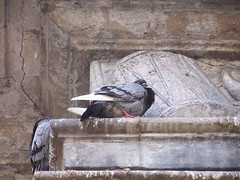
pigeon on ledge photo by LSU DAV.
Inside the bell tower of a downtown Lutheran church, pigeons roost. They huddle in window sills or balance on the craggy edge of stones. Their brethren flutter round and round the tower in circles. It’s cold on the shady side of the north face, which is where Humfelt lays on a window ledge, keeled over to one side like a grounded boat. His eyes are crusted, and his heart flutters erratically in his breast. This will be his last day, he’s almost certain, of being trapped in the body of a pigeon. Last day of pecking at french-fries spilled on the sidewalks, of darting out from under roaring buses. Last day of flight. Last day of ascending to a perch fifteen stories above the city streets. Last day of soaring through canyons of high rises.
How long had he been trapped in the body of a pigeon? Previously he had been a floor trader on Wallstreet, then a cuttlefish, then a mercenary, then a goat, and way way back he faintly recalled life as a magician, a wizard of sorts traveling around villages with a band of other illusionists. He convinced himself from time to time that his tricks were more than just sleight of hand, but that he harnessed actual powers of nature that ordinary mortals did not share. He could make a pretty woman in a crowd take notice of him just through concentration. He could will the gold coins out of a shopkeeper’s pocket and into his own coffers. At night, when he roamed through village streets or out on the edge of town to a milkmaid’s hovel, he could will himself into her bedroom.
Now he gasps a last few lung-fulls of air on the ledge of a chapel tower. It is early spring, a time of rebirth. He wonders through whose eyes he will next look upon the world. His reincarnation had not always been incremental in time, so he’s not even sure into which world he will resurface. Will it be the late 2000’s, or will it be a wheat field in 19th century France. Will he be driving at tank in WW2, or brushing lint off his master’s waistcoat in Edinburgh mansion? A worm boring through coffin wood to get at the rotting flesh within, corporeal fruit wrapped in soil? Or will it be one of those times when he is caught between lives, trapped as a ghost gliding through the lunar mansion?
The one constant in this long thread of lives is that he remains in the orbit of his eternal lover, Rebecca. If he is a pigeon sitting on the shoulder of a statue in a city park, she is a sparrow flitting through the bare branches of crab apple trees lining the park benches. If he is a executioner operating a guillotine in a French square, she is the courtesan expelled from royal halls only to stretch her slim neck across the blade’s edge. The magician lurking outside her window. The worm boring into her grave. Will he ever have her? Yes, he has a thousand times, and a thousand times he has lost her. Which is more painful, in the end? Is there and end?
Sunday, April 15, 2007
Keys to Life

funciona! photo by corbata1982.
The Backspace key is my nemesis. All of these words spill out of me, and just as quickly slip into oblivion as I hold down the Backspace key. Really, these keys hold such warm or bleek possibilities if they could be applied to life. Home. Pause/Break. Delete. End. When I was in Budapeste huddled on a bench in a train station platform, I could have pressed the Home key. During my marriage troubles, I wanted to Pause all of the arguing, but then came the realization that we need to make a clean Break of things. But there are no clean breaks in a divorce. For years afterward, I still thought about her. I imagined I could return to the home we had lived in, and she would be in the kitchen cooking up something, and the dogs would come running and lick me to death as I came through the door. But all of that was gone. A different family lived there now, and it would be so much easier if I could just forget it all. Delete, and it would be like we had never met.
Is life worth all of this struggle? Finding happiness, going to work, paying the bills? Sometimes it seems like it would be easier to press the End key. But I’ve never figured out what happens when you press the End key. An end will come soon enough, so I might as well enjoy myself while I’m here. Insert myself back into the dating world. Now it’s all about making some kind of Shift. Taking Ctrl. Stop watching life pass me by and get the courage to Enter.
Enter.
Enter.
There, now I have some space to work with. It’s time to make use of these twenty-six keys that aren’t so easy. Got to find the right combination of them to find my way, but they also hold infinite possibility. Find the right sequence and you’ve got the complete works of Shakespeare, the Declaration of Independence, and the diary of Anne Frank . Lose your way, and you’ve got the Life of Brettanicus.
Sunday, April 01, 2007
Tax Deductible Expenses

Touchy dragon photo by Jukkie.
I was trying to write a story last night, typing away on my laptop. I sat by the living room window looking out over the city from twenty-five stories up, a view that had provided inspiration on many nights, except now I had seen it so many times that I suppose it was no more inspirational than what a ground-dweller feels when looking out to a dried-up birdbath. Since the words weren’t coming, I had a decision to make: either continue my labors at the noble art of expressing the truth through lies, or file my taxes. I was just logging into TurboTax when a dragon crashed through my window and perched itself on the windowsill. It shook a few shards of broken glass from its head and wings, then leapt into my apartment and, with two hops across the room, alighted on the back of my sofa. It opened up a bag of trail mix that I had left on the coffee table after watching Forrest Gump the previous night and started to nibble. It picks out the pretzels and tosses aside the peanuts.
It looked at me with this satisfied expression and appeared to be about to speak when instead it grabbed an open bottle of Newcastle, tipped it back and downs it in two gulps. It belched, emitting two small puffs of smoke, and then jumped down from off the back of the sofa. It hopped across the room, much like a sparrow hops, back up on the window sill and then plummeted at least a dozen flights before those papery wings caught enough air to propel its considerable mass away from the concrete. It took off towards the Warehouse district, where hip-hop clubs were already forming lines at the doors. I was left standing in my empty apartment with a cold wind blowing in, feeling almost certain the whole thing was imagined, until I heard screams from the girls propped up on their high heals alongside the velvet ropes outside the clubs, heard the screech of tires, the crunch of metal on metal, and a fiery belch. The circling spotlights outside Spin caught the dragon banking across the night sky for a moment, then it was gone.
So my question for you is can I file a tax deduction for the broken window? I mean, it is an expense incurred while in my line of work.

Grandmother and the dragon photo by Anandamide.
Saturday, March 24, 2007
Sunday, March 18, 2007
Safe Harbor
I’d left town to get away from a girl that ran the Tea House with her father. I left town to get my head straight, to find myself somewhere on the highways of the American southwest. Instead I just found dead coyotes and a bad case of hepatitis. I’d been delirious in a roadside hotel just outside of Tucsan. The owner’s mother took care of me there in room number 4. In my fever I was surrounded by demons, most of them looking too much like the father of the girl I was running from. But for the most part, fever deliriums are not what they’re made out to be. Most of the time I just felt frustrated, going round and round in my mind, circular arguments, clammy sheets, the knowledge that I was far from home and slipping into unconsciousness. But then my fever broke and I came out of it, like a boat emerging from a storm into safe harbor. Yeah, I see the parallels.
Okay, so maybe I did see elephants pirhouetting atop telephone poles, and scarecrows doing a mean tap dance down the rows of corn. Maybe I invented a new language from idiotic sounds, shuzzle de bop and de dim bam floozy. Maybe I did find myself in a foreign town of steep hills and nearly vertical streets. I boarded a trolley that laboriously climbed, climbed, climbed, until it reached the apex. What a view, in that split second before the descent. An old drunk drives the trolley, and he frequently drifts off to sleep, awakened only by the blaring car horns as we shoot through intersections against the red lights. He takes another shot from a bottle of rum. His ancestors were pirates, you know, and this infamous bloodline of criminals has diluted itself down to this pathetic figure driving a trolley. Before the trolley crashes through the docks at the edge of the harbor, I leap off while it’s still rolling.
I wander the fishing piers. Great bins of silvery pollock and mackerel, herring and sardine, jellyfish and squid. Mermen cart their catches around in crates, ye traitors of the sea. Where have all the Mermaids gone? Out there in the bay, flipping their glittery green tails in the morning light. Beautiful swelling hips cresting the waterline as they dive deep. I try to steal a rowboat to paddle out to them, to cavort there in the rippling blue water, but all of the boats are filled with pale bloated bodies, flies, and the stench of seaweed. I launch them all out into the bay to let them drift to their final destinations.
Where am I going with this? This is delirium. This is fever. This is like a runaway train that finally rolls to a stop in my home town. Stuttersville.
I leave the station platform and walk across town towards the girl I had been running from. It is in the early morning chill that I crept through wet grass towards the Tea House windows. Inside, a golden light burning from a single lamp in the library. Creeping up to closer, careful not to lean into the light pooling just outside the window, I looked to the two figures inside. The girl, still in her night dress, served up a pot of tea to her father crashed out on the sofa. He was drunk. She nursed him. She had a matronly kind of concern on her face for her father, brushing back a strand of sweaty hair off of his forehead. He wrapped an arm around her waist to pull her close. She peeled back his arm, like some kind of tentacle, and tucked it to his side, then crossed the room to the buffet where she set down the tea pot and wiped her eyes on her sleeve, and I froze there crouched at the window, fingertips held up to the glass.
Saturday, February 24, 2007
Plot Spoiler
He carried a crumpled pack of generic cigarettes in the breast pocket of his red flannel. Cherokee work boots loosely laced. Jeans with a little brake grease smeared on the knee. On the way down the steps he ran into Bridget carrying in a bag of groceries and held open the door for her. She was cute; olive skin, one dimple in her left cheek, white white teeth.
The brisk air smelled of fall, like gutted pumpkins and wet leaves. He walked a block and a half to the bus stop and picked up the 4 uptown, his final destination being a little park nestled between a row of restaurants at where he would never eat, and a trendy fitness club with valet parking.
Somebody was sitting at his favorite bench. He leaned against a tree trunk twenty yards away and stared the guy down until he got up and left. The bench overlooked a small pond ringed with cat-tails, and a playground where a young mother talked on a cell phone while two children scrambled around on the equipment.
The novel’s spine made a slight cracking sound as he opened the covers, releasing a smell of stale cigar smoke and yellowed paper. He read the first sentence, only something didn’t seem right. The words were not that of a 19th century author. There were no butlers or spinsters, no expositions of societal norms, no ladies dying of consumption. But the words spoke to him. Litterally.
Edward, you have to start doing something with your life. See that woman over there, the one on the bench watching her kids? She’s waiting, just like you. Only she’s been waiting for years, and she’s not even sure she wants kids yet, but there’s her four year old with a runny nose pushing the other kid around.
He skipped ahead: Edward, you shouldn’t skip ahead like that. You’ll miss some important information up front, some foreshadowing which might lead to misunderstanding. . .
His heart raced. He started flipping through pages:
. . . Your wife is in a coma. The doctors want to know if you’ll let her go. There are a lot of people waiting for organs right now. . .
Further ahead: Jimmy fell off his bike today and chipped a tooth. You’re going into the doctor to get tested for prostate cancer. Make sure your will is up to date.
Edward finds his place again at the beginning of the book and reads more carefully: Where did this book come from? It wasn’t really your mother’s to have. She stole it from her uncle’s library shortly after his death, during those hours when a family meets under solemn pretext, but secretly their adrenaline is pumping and their eyes scanning the room for value. “What’s mine? What her’s? No, I don’t want it, but I don’t want HER to have it, either. She always got more than me when we were kids, anyway. I should get more.”
It was during those hours of ugliness, when the pettiness of humanity reeks the most, that it turned physical. Your mother and your aunt got into a tussle, trying to reach this book tucked away on the top shelf. Your great uncle had never allowed them to play with it; everything else in the library was fair game, but never, ever, touch this book, he had warned them. Now your mother came out on top, with the leather volume clutched deftly in one arthritic claw, and tucked under her arm for good measure. A running back could have taken lessons from her on how to protect the ball, and she protected hers. All the way back home to Minneapolis.
The ownership of such a valuable book would normally lead one to display it on the optimal shelf, under just the right lighting, with only the most classic of books to nestle on either side of it. Not so with your mother. Maybe she didn’t understand the book. Maybe she feared it. She only ended up repeating the cycle, by tucking it away on the top shelf and forbidding you from ever touching it. But you didn’t wait for her estate to be divided up before getting your hands on it. You couldn’t wait, and you shouldn’t. You’ve been waiting too long for the story of your life to get interesting. Want to learn how your mother’s going to pass on, and when? Turn to page 57…
Saturday, February 17, 2007
Plant Life

To calm himself down, he makes a cup of hot chocolate. He feels at one and the same time like a mother stirring the cup with a spoon, and a little boy licking the chocolate froth off his lips. He returns to the window. A light snow transforms the world of downtown, a kind of fantasy land of glowing lights. All sounds seem to suspend in the air with the flakes and hover, like a trapeze artist caught in the moment after lunging from one rung and reaching out for the other.
He took a sleeping pill about forty-five minutes ago. He should have been down long ago. In his head he hears his own voice saying “time for bed,” like a father and the retort “but I don’t want to,” like a child. He turns his back on the window and looks towards the long path to the bedroom, and that sense of vertigo returns. He tries to make out what those shadows are across the room, tries to hear what the plants are saying to one another. One of the plants reaches around from the corner of the couch as though it plans to touch him with its palms when he passes. Another cringes in a corner, leaves pressed flat against the wall as though petrified of him. But after all, he is seeing the plants come alive. Maybe it should be afraid. Very afraid.
Thursday, February 01, 2007
Rainy Florida Christmas
Saturday, January 27, 2007
Spirit Garden
So many human ashes fertilized the soil of Bok Tower Sanctuary that the place became crowded with the spirits of the departed. Most visitors were blind to the mistral passings across the trails in front of them, deaf to the discontented ghosts bickering over who claimed the best locations for their memorial benches scattered throughout the grounds. Benches levitated throughout the night, walked across the lawns, or were thrown into the middle of the pond, until the morning grounds crew arrived to sort out the mess. They blamed mysterious vandals, probably kids.
Not every visitor lacked the third eye with which to see these ghosts. Some discerned a curiously animated cloud of mist over the lawns, felt a cold brush of air aginst their bare arm, heard the plaintive wail of a grandmother whose ashes were scattered too close to the snakes sunning themselves by the water.
A particularly aggressive squirrel that accosted people walking along the trails was in fact spirited with the lingering soul of Quantanimus James, an accountant who had committed suicide after getting caught money laundering from the Lake Wales Pantheonic Temple in 1962. A ornery man in life makes for one cantankerous squirrel in the afterlife. The squirrel of Quantanimus guarded a gluttonous horde of nuts in the hull of a dead evergreen oak.
Other spirits made themselves known in more subtle ways: the perplexed expression of Uncle Roy in the bark of a tree; the blush of a dead bride in the bloom of Granada roses; the watchful eyes of a lone koi hovering at the surface of the reflecting pool, looking for her niece to come for a visit.
One spirit was that of a young girl, only ten, who had died of leukemia. In her young life she had only time for one passion: dancing. She had wanted to be a ballerina. Now in her afterlife she haunted the surface of the pools in the early morning, turning the pond into her stage, dancing upon the surface, making ripples with her pirouettes.
And the two swans floating on the pond? Many fancied they were the ghosts of two dead lovers, but in truth the swans were nothing but swans, a pair of the only natural specimens moving about the spirit garden.

